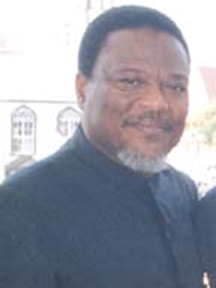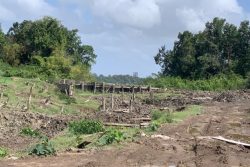Lindeners first took to the streets on April 5 to protest the electricity tariff hike, more than three months before three of them were shot dead by police and at least 20 injured.
In that period the government has failed to clinch an agreement with the town over tariffs.
On April 5, a group of approximately sixty women and men, led by an APNU Parliamentarian, Regional Democratic Council (RDC) and Interim Management Committee (IMC) councilors, took to the streets of Linden chanting “PPP want kill Linden”, “No electricity raise for Linden”, “Deh vex cause we ain’t vote fuh PPP”, “No GPL fuh Linden”, among other remarks.

Their action came less than a week after Minister of Finance Dr Ashni Singh made the announcement at the reading of the national budget.
Then on April 18 residents shut down the town to show solidarity with the movement against the proposed tariff increases. With the exception of the Linden Hospital there was not a single entity open on that day and the six ferry services which plied the two shores of the Demerara River were all out of operation. No round-the-town transportation or Linden-to- Georgetown buses or taxis were working that day. Schools were also affected by the shutdown as teachers didn’t show up and just a few students were at school.
At the break of day residents on the Wismar shore converged at the Linden Utility Services Co-op Society Limited (LUSCSL) and marched to the Winifred Gaskin Highway Junction at the Silvertown area.
Another large group which moved from the One Mile area joined them, forming a sea of residents who peacefully marched across the Mackenzie-Wismar bridge where there was a heavy police presence guarding the passage.
“We peaceful we ain’t ready fuh block bridge. We going through sending a message”, one protestor said to a police rank.
From all indications it was sometime after the first protest action that government entered into talks with the opposition as on April 18, Prime Minister Samuel Hinds during a sitting at the National Assembly announced that the APNU and government had agreed that the elimination of the subsidy and the alignment of Linden with GPL tariffs were necessary.
He said that the ongoing discussions focused on Linden and disclosed that in relation to electricity tariffs, it was further agreed that the first stage of the tariff adjustment this year would be implemented “along the lines outlined and in a manner that would ensure adherence to the allocation provided” in the budget.
The party’s agreement with the government sparked uproar at Linden and APNU was left to do damage control in the mining town and to state that it had given no such blessing to the tariff hike.
Later, APNU criticized the move and called on the government to implement a series of relief measures for the mining town before raising electricity tariffs.
AFC Chairman Khemraj Ramjattan on April 21, while warning of possible national unrest, urged the government to go back to the drawing board on its plan to increase the electricity rates for the mining town.
On June 20, Prime Minister Hinds who is responsible for the power sector announced that the increase would take effect from July 1.
During another protest towards the end of that month, Regional Chairman Kuice Sharma Solomon told residents that a massive protest was being planned.
On July 18, what was intended to be a five day protest started and by the end of that day persons had been shot dead and injured during a confrontation with the police near the Mackenzie/Wismar bridge.




